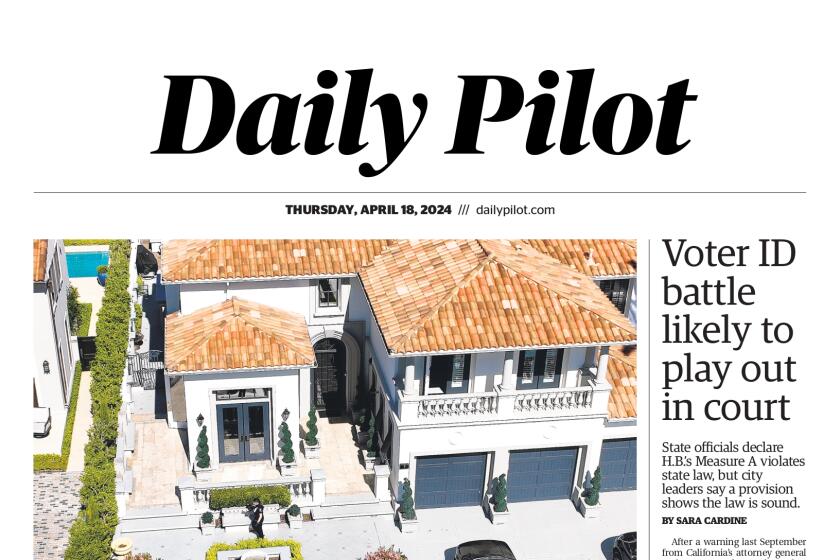Council tweaks campaign documents ordinance
Huntington Beach council members on Monday made multiple changes to the initial draft of an ordinance regulating campaign documents.
The item introduced by Councilman Joe Shaw passed on a 4-3 vote, with Mayor Pro Tem Matthew Harper and councilmen Joe Carchio and Jim Katapodis dissenting.
The ordinance, whose language is based on a law that was repealed in 2008, would require candidates to file campaign documents with the city clerk.
Right off the bat, council members had issues with the way the item was written.
Five changes were made to the first draft Monday night, including requiring candidates to file their campaign literature if they were distributing 1,000 or more pieces, up from 200 under the old ordinance, adjusting the severity of the penalty from a misdemeanor to a civil citation and including mailed and hand-delivered pieces.
Council members will have a first reading of the revised proposed ordinance May 6.
The ordinance is an effort to deter candidates from sending out “hit pieces” and allowing other candidates and the public to see what is being sent, Shaw said.
“If you are going to [create] a mailer that has lies and slander, then everyone should be able to see [it] and know where the money came from,” he said.
Councilwoman Jill Hardy, who was part of a committee to repeal the original law, knows firsthand about being attacked with falsehoods in campaign mailers. During the 2012 elections, a campaign mailer accused Hardy of endangering children and said her brother was a registered sex offender, according to an article by the Independent.
A review of public records by the newspaper showed her brother was not a registered sex offender. He was, however, convicted of having consensual oral sex with a 17-year-old college student he was dating when he was 26.
The councilwoman is quoted as saying at the time: “It was a misdemeanor, he served his probation, and he’s not a registered sex offender. His issue has nothing to do with me or my candidacy.”
At Monday’s council meeting, she said: “Everybody handles such things differently. One person might choose to go see and know what is actually on the piece and get the peace of mind about what it is. Some people might want to wait and prolong that. … So having it available from that perspective, I can’t say that it would’ve helped me to know two days ahead of time, but in reflection it might [have].”
But Hardy said the reason she wants this ordinance back is not to snuff out negative mailers, but to give other candidates and the public a chance to educate themselves about the issues during a campaign.
Harper didn’t like the idea that the city would be required to be “a tool in campaigns,” he said.
“Part of my concern is that this would mandate that the city clerk’s office to become a city-funded campaign research tool,” Harper said.
The mayor pro tem presented several questions to City Attorney Jennifer McGrath, including: Can the number of hand-distributed pieces can be verified? Would mailers sent to specific demographic goups need to be filed as well? Is there a way to verify the accuracy of what was written?
Katapodis thanked Shaw for bringing up the issue and said he sees its importance but believes the ordinance has too many changing variables and tries to do too much, he said.
Mayor Connie Boardman said the previous ordinance worked and that concerns may be being blown out of proportion.
“It worked fine before it was repealed and I have a little bit of a feeling that we’re making a big tempest in a teapot here,” she said.
anthonyclark.carpio@latimes.com
Twitter: @acocarpio
All the latest on Orange County from Orange County.
Get our free TimesOC newsletter.
You may occasionally receive promotional content from the Daily Pilot.



